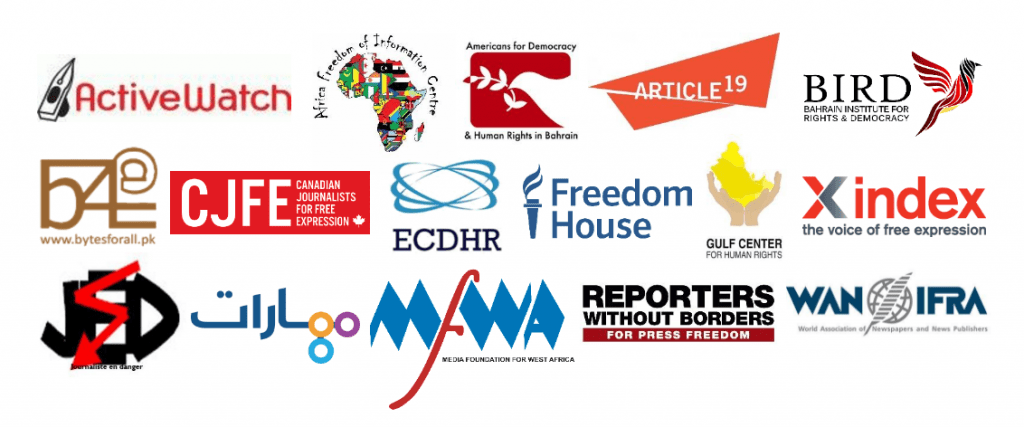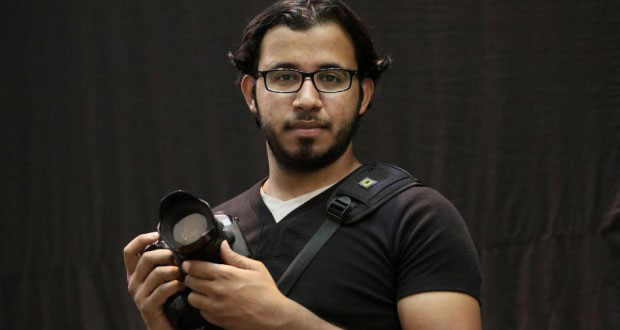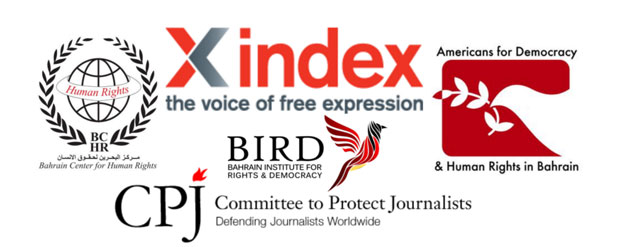Index relies entirely on the support of donors and readers to do its work.
Help us keep amplifying censored voices today.
[vc_row][vc_column][vc_column_text]
To: Sheikh Hamad bin Isa Al Khalifa
King of Bahrain
CC: Hon. Zeid Ra’ad Zeid al-Hussein
High Commissioner for Human Rights
Ms. Frederica Mogherini
High Representative of the European Union for Foreign Affairs and Security Policy
Mr. Sigmar Gabriel
Vice-Chancellor and Foreign Minister of the Federal Republic of Germany
Mr. Rex W. Tillerson
United States Secretary of State
The Right Honorable Boris Johnson
Foreign & Commonwealth Office of the United Kingdom
Mr. Jean-Marc Ayrault
Minister of Foreign Affairs of France
King Hamad,
We, the undersigned, express our deep concern with the government of Bahrain’s continued targeting of journalists, which further restricts free press and expression in the country. On 23 April 2017, the court of appeals will hold another hearing for Sayed Ahmed Salman al-Mousawi, an internationally-renowned photographer, after he was arrested more than three years ago for alleged terrorist activities. The government’s repeated harassment of al-Mousawi and other journalists highlight the ongoing censorship and restrictions on free press and expression in Bahrain.
Sayed Ahmed Salman al-Mousawi is a 29-year-old freelance photographer who has won 169 international photography prizes—a number of which he even won while in detention. He is a member of FIAP, PSA, UPI and Qatif photos.
Authorities arrested al-Mousawi, along with his brother Sayed Mohammed, on 10 February 2014 from their home in Duraz. The plain-clothes masked policemen did not present any arrest warrant and confiscated his cameras and electronic devices. After holding al-Mousawi for six days, officials transferred him to Dry Dock prison. Security forces then took him to the Criminal Investigations Directorate (CID) for another six days where they tortured him “cruelly without mercy,” as he later told his father. Security officers hung him on a door four times, electrocuted him, and did not allow him to sit for four days. They stripped him naked, beat him and sexually assaulted him. No independent investigation into his torture allegations has ever been conducted.
Al-Mousawi spent over nine months in detention without official charges against him. At his first trial on 24 December 2014, the prosecutor charged him with forming and participating in a terror cell, accusing him of providing SIM cards to protesters —“terrorists”—and taking photos of anti-government demonstrations. He and other witnesses denied that he had anything to do with the riots. Over the course of 2015, officials postponed his trial six times. Meanwhile, the government continued to deny him his basic human rights, including restricting access to a lawyer, placing him in solitary confinement, and denying family visits.
On 23 November 2015, the Bahraini court sentenced al-Mousawi to 10 years imprisonment and revoked his citizenship. However, the Court of Cassation overturned the ruling earlier this year. His postponed appeal hearing next month provides an opportunity to end his prolonged arbitrary detention and mistreatment. Al-Mousawi has now been held arbitrarily for over three years, merely for exercising his right to free expression.
Al-Mousawi’s case is representative of the Bahraini government’s growing repression against basic civil rights. We, the undersigned, have raised our concern over numerous cases of torture, arbitrary detention, unfair trials, and trumped up terrorism charges used to restrict expression unfavourable to the government. Journalists, bloggers, online activists and human rights defenders such as Faisal Hayyat, Nazeeha Saeed, and Nabeel Rajab, among others, have increasingly come under attack by authorities since the 2011 pro-democracy protests. Arbitrary arrests of journalists, systematic torture and impunity have turned Bahrain into a dangerous country for those who speak out. The country is ranked 162nd out of 180 countries in Reporters Without Borders’ (RSF) 2016 World Press Freedom Index and has become one of the biggest detainers for journalists and bloggers with at least 14 behind bars as of today.
Furthermore, the government has also censored and restricted the media, most recently in January, temporarily suspending the online version of Alwasat, the only independent newspaper in the country. Through a combination of media and counterterrorism legislation, as well as excessive government oversight, to justify their actions against the press and journalists, Bahraini officials continue to act with impunity.
The targeting and judicial harassment of journalists simply performing their work is unacceptable and violates international human rights standards. Bahrain is a signatory to the International Covenant on Civil and Political Rights (ICCPR), which states in Article 19 that “Everyone shall have the right to freedom of expression.” This includes the requirement that “a free press and other media [be] able to comment on public issues without censorship or restraint and to inform public opinion.” The pattern of reprisals and suppression of freedom of express far exceeds the limited restrictions placed on this right under article 19.3.
We, the undersigned, raise our concerns about restrictions on free press and expression in Bahrain and call on the Bahraini government to:
Signed,
ActiveWatch (Romania)
Africa Freedom of Information Centre
Americans for Democracy & Human Rights in Bahrain (ADHRB)
Article 19
Bahrain Institute for Rights and Democracy (BIRD)
Bytes for All, Pakistan
Canadian Journalists for Free Expression
European Center for Democracy and Human Rights
Freedom House
Gulf Center for Human Rights
Index on Censorship
Journaliste en Danger (JED)
Maharat Foundation
Media Foundation for West Africa
Reporters Without Borders (RSF)
World Association of Newspapers and News Publishers[/vc_column_text][/vc_column][/vc_row][vc_row][vc_column][vc_basic_grid post_type=”post” max_items=”4″ element_width=”6″ grid_id=”vc_gid:1492705737868-c65e7005-0971-10″][/vc_column][/vc_row]

Photographer Sayed Ahmed al-Mousawi
Award-winning photographer Sayed Ahmed al-Mousawi was sentenced on Monday, 23 November 2015, to 10 years in prison and had his nationality revoked, along with 12 others, after covering a series of demonstrations in early 2014. Security forces detained Al-Mousawi for over a year without trial or official charges, accused him of being a part of a terrorist cell and subjected him to torture. The undersigned NGOs condemn the government’s continued attacks on independent journalism, policy of media censorship and severe restrictions on freedom of expression in Bahrain.
Sayed Ahmed al-Mousawi, a winner of 127 international photography awards, has been incarcerated since his arrest on 10 February 2014, when security forces raided his home in Duraz village. According to al-Mousawi’s father, a group of plainclothes masked policemen arrested Sayed Ahmed and his brother. The police provided no arrest warrant and confiscated al-Mousawi’s cameras and electronic devices. Al-Mousawi alleges that he was tortured during his detention and interrogation.
Al-Mousawi’s torture follows a pattern of abuse Human Rights Watch documented in a new report released on 24 November on the ongoing use of torture in Bahraini police detention and prison. Police disappeared and tortured al-Mousawi for five days, subjecting him to severe beatings on his genitals, electrocution and hanging from a door. For the duration of his disappearance, he was stripped naked and forced to stand for long periods of time. Officers did not allow a lawyer to accompany al-Mousawi when they transferred him to the Public Prosecutor. Courts renewed al-Mousawi’s pre-trial detention six times, and he spent over a year in prison without formal charges.
“Sayed al-Mousawi’s torture took place at a time when the UK has been increasing its spending on a ‘reform programme’ for Bahrain to bolster its institutions,” said Sayed Ahmed Alwadaei, Director of Advocacy at BIRD. “It is becoming increasingly clear that this programme has failed. Torture is still systematic and unrelenting and the government has broken all promises of reform.”
During his extended detention, al-Mousawi continued to win international awards for his photography. In spite of this, the government accused him of giving SIM cards to “terrorist” demonstrators and taking photos of anti-government protests. As a result, Bahrain tried al-Mousawi under Bahrain’s vague anti-terrorism legislation. A judge later accused him and his brother of membership in a terrorist cell, which al-Mousawi continues to deny.
“Al-Mousawi’s case exposes Bahrain’s continued misapplication of its counterterrorism law to hide evidence of its human rights abuses,” said Husain Abdulla the Executive Director of ADHRB. “Taking photos of peaceful protestors is not a crime and Bahrain’s overreaction shows just how fearful the Bahraini government is of its own people.”
Bahrain’s continued arrest of journalists and photographers, who expose human rights violations, reflects a systematic campaign by the authorities to quell freedom of expression and the press. Bahrain is ranked 163 out of 180 in the 2015 World Press Freedom Index according to Reporters Without Borders. Last year, a Bahraini court also convicted another renowned photojournalist, Ahmed al-Humaidan to 10 years in prison under similar charges. Bahrain has revoked the citizenship of more than 130 individuals since 2012.
“Yet again the Bahraini government has wielded citizenship as a weapon of censorship against journalists,” said CPJ’s Middle East and North Africa program coordinator, Sherif Mansour. “We call on the Bahraini judiciary to overturn this disturbing sentence, recognize al-Mousawi’s citizenship, and free him immediately.”
We, the undersigned NGOs, call for the immediate release of Sayed Ahmed al-Mousawi, and on Bahrain to end the criminalization of free speech and press. We also call on the UK government to suspend its spending on technical assistance to Bahrain, and on the US government to reinstate the ban on arms sales to the country, until systematic torture has been eradicated and restrictions on the enjoyment of internationally-codified human rights are lifted.
Sincerely,
Americans for Democracy & Human Rights in Bahrain (ADHRB)
Bahrain Center for Human Rights (BCHR)
Bahrain Institute for Rights and Democracy (BIRD)
Committee to Protect Journalists (CPJ)
Index on Censorship
